爱伦坡的《乌鸦》The_Raven_by_Edgar_Allan_Poe(辰阳译)
allan poe 最著名的诗

《乌鸦》和《安娜贝尔·李》等是爱伦·坡最著名的诗。
1.爱伦·坡(Edgar Allan Poe,1809年1月19日-xxx),美国文学家、诗人、小说家、文学评论家和编辑,被誉为恐怖文学和侦探小说之父,以其心理恐怖文学作品著称。
2.《乌鸦》是爱伦·坡最著名的诗之一,它被认为是美国文学史上最伟大的作品之一,直到今天它仍然具有深远的影响力。
3.这首诗以诗人孤独和悲伤的内心世界为主题,描述了一个孤独哀伤的男子,因失去了心爱的女人琳达而陷入绝望之中。
4.诗中的“乌鸦”代表了逝去的象征,它不断地重复“从未更”这句话,无情地嘲讽诗人,使他更加绝望和绝望。
5.《乌鸦》采用了复杂的韵律和押韵,诗歌节奏感极强,语言精练而深刻,给人以极强烈的震撼。
6.另一首著名的爱伦·坡的诗是《安娜贝尔·李》,它也是他的代表作之一,被认为是恐怖文学史上的经典之作。
7.《安娜贝尔·李》以其超凡的想象力和深刻的洞察力,揭示了诗人对已故恋人的思念之情,以及对逝去爱情的深深怀念。
8.这首诗以其独特的想象力和对逝去的恐惧感,将爱情和逝去结合在一起,表现出了爱伦·坡深沉的内心世界和对恐怖的探索。
9.《乌鸦》和《安娜贝尔·李》都具有极强的艺术价值和文学价值,它们对后世的文学创作产生了深远的影响,成为了后世文学作品的重要源泉。
10.爱伦·坡最著名的诗《乌鸦》和《安娜贝尔·李》不仅在诗歌创作上具有极高的艺术价值,而且在文学史上还产生了深远的影响,成为了美国文学史上的经典之作。
爱伦·坡(Edgar Allan Poe)以其独特的文学风格和对人性黑暗面的深刻洞察而闻名。
在他那短暂而不幸的一生中,他留下了许多著名的作品,其中最著名的当属《乌鸦》和《安娜贝尔·李》这两首诗。
《乌鸦》中的主人公,原本是一个愉快的年轻人,然而他的丧偶给他带来了无尽的痛苦和绝望。
the raven译文

乌鸦爱伦·坡著◇曹明伦译(安徽文艺出版社1999年版本)从前一个阴郁的子夜,我独自沉思,慵懒疲竭,面对许多古怪而离奇、并早已被人遗忘的书卷;当我开始打盹,几乎入睡,突然传来一阵轻擂,仿佛有人在轻轻叩击——轻轻叩击我房间的门环。
“有客来也”,我轻声嘟喃,“正在叩击我的门环,惟此而已,别无他般。
”哦,我清楚地记得那是在风凄雨冷的十二月,每一团奄奄一息的余烬都形成阴影伏在地板。
我当时真盼望翌日——因为我已经枉费心机想用书来消除伤悲,消除因失去丽诺尔的伤感,因那位被天使叫作丽诺尔的少女,她美丽娇艳,在此已抹去芳名,直至永远。
那柔软、暗淡、飒飒飘动的每一块紫色窗布使我心中充满前所未有的恐惧,我毛骨悚然;为平息我心儿的悸跳.我站起身反复念叨“这是有客人想进屋,正在叩我房间的门环,更深夜半有客人想进屋,正在叩我房间的门环,惟此而已,别无他般。
”于是我的心变得坚强;不再犹疑,不再彷徨,“先生”,我说,“或夫人,我求你多多包涵;刚才我正睡意昏昏,而你敲门又敲得那么轻,你敲门又敲得那么轻,轻轻叩我房间的门环,我差点以为没听见你”,说着我打开门扇——但惟有黑夜,别无他般。
凝视着夜色幽幽,我站在门边惊惧良久,疑惑中似乎梦见从前没人敢梦见的梦幻;可那未被打破的寂静,没显示任何象征,“丽诺尔?”便是我嗫嚅念叨的惟一字眼,我念叨“丽诺尔”,回声把这名字轻轻送还;惟此而已,别无他般。
我转身回到房中,我的整个心烧灼般疼痛,很快我又听到叩击声,比刚才听起来明显。
“肯定”,我说,“肯定有什么在我的窗棂;让我瞧瞧是什么在那儿,去把那秘密发现,让我的心先镇静一会儿,去把那秘密发现;那不过是风,别无他般!”然后我推开了窗户,随着翅膀的一阵猛扑,一只神圣往昔的乌鸦庄重地走进我房间;它既没向我致意问候,也没有片刻的停留,而是以绅士淑女的风度栖到我房门的上面,栖在我房门上方一尊帕拉斯半身雕像上面;栖息在那儿,仅如此这般。
于是这只黑鸟把我悲伤的幻觉哄骗成微笑,以它那老成持重一本正经温文尔雅的容颜,“冠毛虽被剪除”,我说,“但你显然不是懦夫,你这幽灵般可怕的古鸦,漂泊来自夜的彼岸,请告诉我你尊姓大名,在黑沉沉的冥府阴间!”乌鸦答曰“永不复焉”。
爱伦坡《乌鸦》赏析

爱伦坡《乌鸦》赏析-CAL-FENGHAI.-(YICAI)-Company One1
《乌鸦》赏析
爱伦坡,美国哥特式文学大师与先驱,他深信“诗歌的最好主题是死亡,尤其是美丽尤物的死亡,将毫无疑问是世界上最具诗意的主题”。
而其在《乌鸦》中也糅合了具有死亡之美的哥特式元素。
《乌鸦》一开篇就给读者营造了一幅阴森恐怖的画面:在阴郁寒冷的午夜,除寒风呼啸之外只余男子的翻书声,一切沉浸在无边的黑暗之中。
突然而至的敲门声,惊醒屋内之人,应门而去却发现屋外空无一物,只有肆虐的狂风融合在黑夜之中。
旋身离去敲门声又起,乌鸦随声而至,停留在房门的半身雕塑上。
午夜恐怖而阴森,为乌鸦——这来自幽河冥界的使者奠定了基调。
而故事又发生在狭小阴暗的小屋,这就突出显现了哥特式写作手法——恐怖与死亡交融(午夜,封闭小屋,乌鸦,亡魂)。
小屋也曾是男子与妻子的爱巢,紫色窗帘,紫色天鹅绒椅,浪漫温馨,如今物什仍在,人却消亡,空余男子,睹物思人。
此时乌鸦强行进入男子封闭的空间,以它的四字箴言“永不复回”,打碎了男子的幻想。
颤抖的灵魂在呼啸的寒风中追问着冥之使者可有神药忘却相思之苦,红尘之恼,换来的还只是“永不复回”。
永不复回的时光,永不复回的爱人,将会带走沉浸在永恒悲痛中无法醒来的灵魂:既然现世无法再见,那就相约幽冥河畔,彼岸尽头再相遇,相拥。
艾伦坡乌鸦theraven中英对照
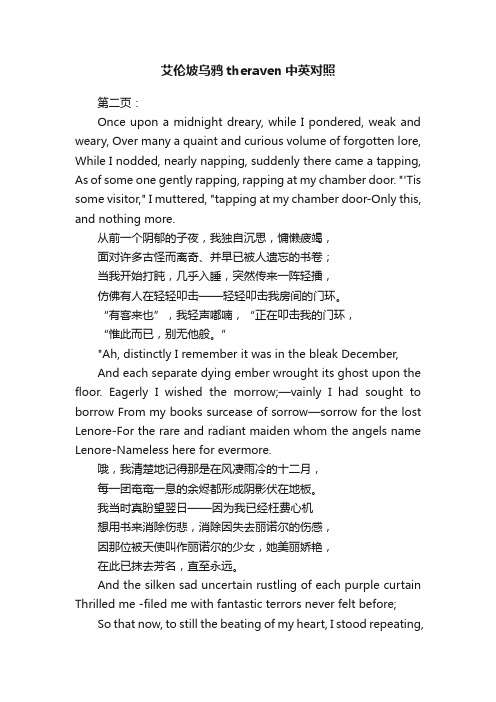
艾伦坡乌鸦theraven中英对照第二页:Once upon a midnight dreary, while I pondered, weak and weary, Over many a quaint and curious volume of forgotten lore, While I nodded, nearly napping, suddenly there came a tapping, As of some one gently rapping, rapping at my chamber door. "'Tis some visitor," I muttered, "tapping at my chamber door-Only this, and nothing more.从前一个阴郁的子夜,我独自沉思,慵懒疲竭,面对许多古怪而离奇、并早已被人遗忘的书卷;当我开始打盹,几乎入睡,突然传来一阵轻擂,仿佛有人在轻轻叩击——轻轻叩击我房间的门环。
“有客来也”,我轻声嘟喃,“正在叩击我的门环,“惟此而已,别无他般。
”"Ah, distinctly I remember it was in the bleak December,And each separate dying ember wrought its ghost upon the floor. Eagerly I wished the morrow;—vainly I had sought to borrow From my books surcease of sorrow—sorrow for the lost Lenore-For the rare and radiant maiden whom the angels name Lenore-Nameless here for evermore.哦,我清楚地记得那是在风凄雨冷的十二月,每一团奄奄一息的余烬都形成阴影伏在地板。
爱伦坡的《乌鸦》The_Raven_by_Edgar_Allan_Poe(辰阳译)

乌鸦很久前一个阴郁的午夜,我感到疲惫而又慵懒一边沉思着那些早已为世人遗忘的离奇书卷一边又点头连连,睡意恹恹。
忽有敲门声回响在耳畔仿佛有人轻轻地、轻轻地叩响了我的门环“这是某位来客”,我嘀咕着说,“在把房门叩击——仅此而已,别无它事!”啊!我至今清晰犹记,那是一个凄楚的冬季每一块儿将尽而未尽的木炭,依然在地板上幽灵般熰燃我急切地守候着天亮,并且徒劳地希望能够在书中聊且把悲伤埋葬,为那逝去的丽诺而哀伤为那天使称其为丽诺的、明净而又唯一的姑娘,——而今却永远,无以仿佛其形象。
每一个紫色的丝绸窗帘,都发出瑟瑟的低沉哀怨让我心惊,让我感到前所未有的莫名惶恐直到现在,我的心仍旧在不停悸动“这是某位来客,恳请借宿休息某位晚归的来客,恳请借宿于此——仅此而已,别无它事!”我的心很快变得坚强,不再那么犹豫而又彷徨“先生?或者是女士”,我说,“我真诚地向您表达歉意当您前来敲门儿,正好我正在打盹儿您轻轻地敲门,是如此之轻盈以至于我不能肯定,我是否真的听清。
”于是我把房门打开——但见漆黑一片,空无一物存在我极目向黑暗中张望,长久地矗立着,恐惧而又迷茫疑虑、冥思,冥思那些无人敢于冥思的问题然而沉静依然如故,死寂一如其初唯一听到的话语,是那低声的私语,“丽诺?”我这么说着,并听到回声从耳旁掠过,“丽诺!”仅此而已,别无它事。
转身走入房门,心中犹如火焚更响的敲门声再次响起“肯定是”,我说,“肯定是什么东西扰动了窗格子让我去,让我去探清那里的秘密让我的心稍事平息,好弄清楚这里的底细。
”——是风而已,别无它事。
当我伸手拉开百叶窗,却看到一只乌鸦振动着翅膀一只远古传说中的庄严的乌鸦从天而降没有半点的谦恭,没有半刻的暂停俨然一位夫人或主人,蹲居于我的房门恰恰蹲居在我的房门之上,栖息于那尊半身的雅典娜塑像——就这样蹲居,就这样栖息,仅此而已,别无它事。
我的迷思变成了微笑皆因这黑鸟阴沉而又冷峻的容貌“尽管你的鸟冠平坦如剪,你却一定不是懦夫”,我敢断言“不是阴森可怖的古老乌鸦,飞离于冥夜的海岸告诉我,在普鲁同的冥夜之岸,该如何把你高贵的名字呼唤!”乌鸦答曰:“永不复焉。
爱伦坡-乌鸦-Edgar-Allen-Poe-and-The-Raven

The Philosophy of Composition 《创作原理》 The Poetic Principle 《诗歌原则》
Themes
1. death – predominant theme
“Poe is not interested in anything alive. Everything in Poe’s writings is dead.”
2. He is the father of psychoanalytic(心理 分析的) criticism.
3. He is the father of the detective story.
The analysis of some
images
in The Raven
The raven and the demon
an evil genius
Emerson: "the jingle man"
Whitman: “its narrow range and unhealthy, lurid quality” (不丰富的选 材和不健康、可怕的质量)
He was understood by critics and other writers in America.
乌鸦诗
秋思 马致远 枯藤老树昏鸦,小桥 流水人家。 古道西风瘦马,夕阳 西下,断肠人在天涯。
秋思 白朴 孤村落日残霞,轻烟老 树寒鸦一点飞虹影下, 青山绿水,白草红叶黄 花。
Meaning changing
Actually before Tang dynasty the raven had a meaning of luck and people thought they were prophets, but after Tang the raven has become an ill-omen
the raven的典故
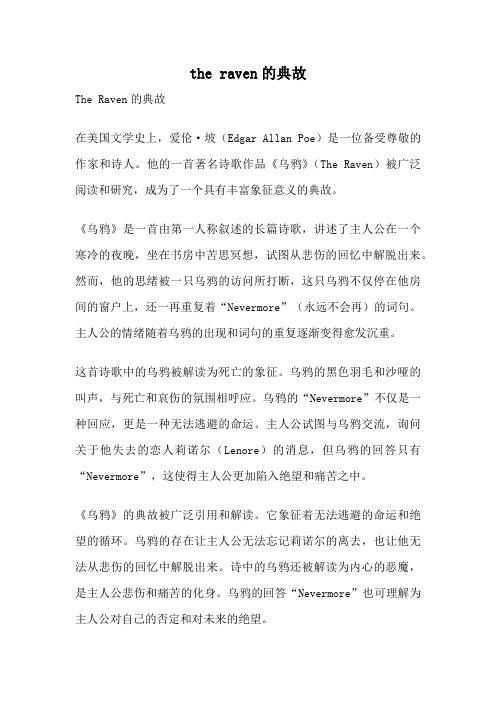
the raven的典故The Raven的典故在美国文学史上,爱伦·坡(Edgar Allan Poe)是一位备受尊敬的作家和诗人。
他的一首著名诗歌作品《乌鸦》(The Raven)被广泛阅读和研究,成为了一个具有丰富象征意义的典故。
《乌鸦》是一首由第一人称叙述的长篇诗歌,讲述了主人公在一个寒冷的夜晚,坐在书房中苦思冥想,试图从悲伤的回忆中解脱出来。
然而,他的思绪被一只乌鸦的访问所打断,这只乌鸦不仅停在他房间的窗户上,还一再重复着“Nevermore”(永远不会再)的词句。
主人公的情绪随着乌鸦的出现和词句的重复逐渐变得愈发沉重。
这首诗歌中的乌鸦被解读为死亡的象征。
乌鸦的黑色羽毛和沙哑的叫声,与死亡和哀伤的氛围相呼应。
乌鸦的“Nevermore”不仅是一种回应,更是一种无法逃避的命运。
主人公试图与乌鸦交流,询问关于他失去的恋人莉诺尔(Lenore)的消息,但乌鸦的回答只有“Nevermore”,这使得主人公更加陷入绝望和痛苦之中。
《乌鸦》的典故被广泛引用和解读。
它象征着无法逃避的命运和绝望的循环。
乌鸦的存在让主人公无法忘记莉诺尔的离去,也让他无法从悲伤的回忆中解脱出来。
诗中的乌鸦还被解读为内心的恶魔,是主人公悲伤和痛苦的化身。
乌鸦的回答“Nevermore”也可理解为主人公对自己的否定和对未来的绝望。
《乌鸦》的典故不仅在文学作品中被引用,也广泛出现在电影、音乐和艺术作品中。
乌鸦的形象被用来表达死亡、哀伤和绝望的情感。
它的黑色羽毛和沙哑的叫声成为了文化符号,经常被用来描绘恐怖和神秘的氛围。
除了象征意义外,诗歌本身的结构和语言也成为了学术研究的对象。
《乌鸦》采用了押韵和节奏的手法,使诗歌更加富有韵律感。
诗中使用了丰富的修辞和意象,让读者在阅读中感受到深邃的情感和思考。
总的来说,The Raven的典故是一个富有象征意义的文学作品。
它通过乌鸦的形象和词句的重复,表达了绝望、痛苦和无法逃避的命运。
爱伦·坡和他那只神秘的乌鸦——爱伦·坡的《乌鸦》作品赏析

收j鸸日期:201 3-5-31;修改j禹:2013-7-1 Teachers
84)。对死亡美的追求,正是人们对渴望不可及 的美的追求,是对永恒美的渴望。这种追求是痛 苦的、无止境的,但其过程却是美的,是一种精 神的享受和境界的陶冶。
埃票篡磊蔗曩二
1.内容简介
《乌鸦》一诗讲述了一个青年学生,由于失
思非但没有平复,反倒倍加沉重。
2.爱伦・坡的诗歌美学
爱伦-坡认为诗歌创作的主要目的是表现 美,即在读者中引起美的情感,美的享受。而美 的目的就是要在读者心中产生“令人升华了的心
灵震颧”。无论什么样的美,只要能打动人的心 灵,能让人情动泪下就能使人的心灵净化。因
风格。他在代表作《乌鸦》一诗中成功地塑造了一只令人印象深刻的乌鸦。本文从内容简 介、爱伦・坡的诗歌美学、创作灵感的由来、特点分析等四个方面加以探讨,有助于加深读
者对联乌鸦》一诗的理解。
关键词:爱伦・坡;
【中图分类号】106
《乌鸦));赏析
【文献标识码】A 【文章编号】1006—2831(2013)11—0204—3 doi:10.3969/j.issn.1006—2831.2013.04.055
2004(4). 张艳.论Ⅸ弗洛斯河上的磨坊》中维多利亚时期女性的社会地位
反映与心理诉求[J].山花:作品研究,2011(3).
万方数据
爱伦·坡和他那只神秘的乌鸦——爱伦·坡的《乌鸦》作品赏 析
作者: 作者单位: 刊名: 英文刊名: 年,卷(期): 高金和 临沧师范高等专科学校,云南临沧,677000 疯狂英语(教师版) Crazy English Teachers 2013(4)
The_Raven中英文赏析

The_Raven中英文赏析乌鸦(爱伦?坡著)? 曹明伦译(安徽文艺出版社1999年版本)从前一个阴郁的子夜,我独自沉思,慵懒疲竭,面对许多古怪而离奇、并早已被人遗忘的书卷; 当我开始打盹,几乎入睡,突然传来一阵轻擂,仿佛有人在轻轻叩击——轻轻叩击我房间的门环。
“有客来也”,我轻声嘟喃,“正在叩击我的门环,惟此而已,别无他般。
”哦,我清楚地记得那是在风凄雨冷的十二月,每一团奄奄一息的余烬都形成阴影伏在地板。
我当时真盼望翌日——因为我已经枉费心机想用书来消除伤悲,消除因失去丽诺尔的伤感,因那位被天使叫作丽诺尔的少女,她美丽娇艳,在此已抹去芳名,直至永远。
那柔软、暗淡、飒飒飘动的每一块紫色窗布使我心中充满前所未有的恐惧,我毛骨悚然; 为平息我心儿的悸跳(我站起身反复念叨“这是有客人想进屋,正在叩我房间的门环,更深夜半有客人想进屋,正在叩我房间的门环,惟此而已,别无他般。
”于是我的心变得坚强;不再犹疑,不再彷徨,“先生”,我说,“或夫人,我求你多多包涵; 刚才我正睡意昏昏,而你敲门又敲得那么轻,你敲门又敲得那么轻,轻轻叩我房间的门环,我差点以为没听见你”,说着我打开门扇——但惟有黑夜,别无他般。
凝视着夜色幽幽,我站在门边惊惧良久,疑惑中似乎梦见从前没人敢梦见的梦幻; 可那未被打破的寂静,没显示任何象征,“丽诺尔,”便是我嗫嚅念叨的惟一字眼,我念叨“丽诺尔”,回声把这名字轻轻送还;惟此而已,别无他般。
我转身回到房中,我的整个心烧灼般疼痛,很快我又听到叩击声,比刚才听起来明显。
“肯定”,我说,“肯定有什么在我的窗棂; 让我瞧瞧是什么在那儿,去把那秘密发现,让我的心先镇静一会儿,去把那秘密发现;那不过是风,别无他般~”然后我推开了窗户,随着翅膀的一阵猛扑,一只神圣往昔的乌鸦庄重地走进我房间; 它既没向我致意问候,也没有片刻的停留,而是以绅士淑女的风度栖到我房门的上面,栖在我房门上方一尊帕拉斯半身雕像上面;栖息在那儿,仅如此这般。
爱伦·坡《乌鸦》的美学解读——最后的挽歌
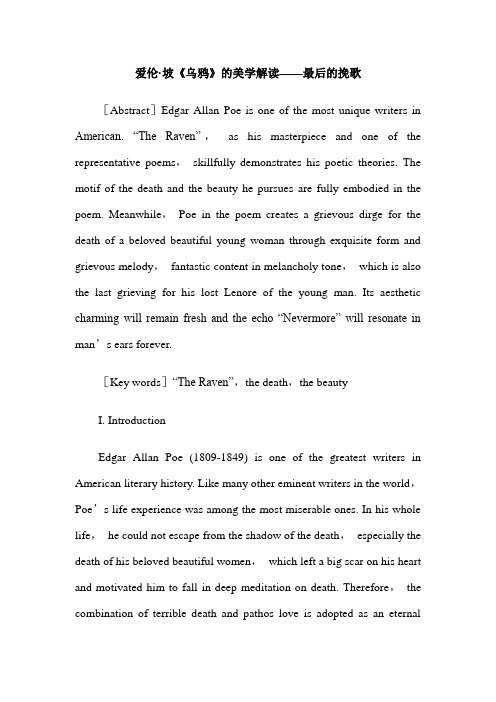
爱伦·坡《乌鸦》的美学解读——最后的挽歌[Abstract]Edgar Allan Poe is one of the most unique writers in American. “The Raven”,as his masterpiece and one of the representative poems,skillfully demonstrates his poetic theories. The motif of the death and the beauty he pursues are fully embodied in the poem. Meanwhile,Poe in the poem creates a grievous dirge for the death of a beloved beautiful young woman through exquisite form and grievous melody,fantastic content in melancholy tone,which is also the last grieving for his lost Lenore of the young man. Its aesthetic charming will remain fresh and the echo “Nevermore” will resonate in man’s ears forever.[Key words]“The Raven”,the death,the beautyI. IntroductionEdgar Allan Poe (1809-1849) is one of the greatest writers in American literary history. Like many other eminent writers in the world,Poe’s life experience was among the most miserable ones. In his whole life,he could not escape from the shadow of the death,especially the death of his beloved beautiful women,which left a big scar on his heart and motivated him to fall in deep meditation on death. Therefore,the combination of terrible death and pathos love is adopted as an eternaltheme nearly in all of Edgar Allan Poe’s literary creation. He concludes that “the de ath a beautiful woman is unquestionably,the most poetical in the world” (常耀信,2003:106). In the deaths of beauties,Poe tries his best to give readers the feeling of regret and heartache and makes readers feel sad and somber as the protagonists do in his stories. “The Raven”,one of Poe’s representative poems,is by no means excluded,in which a melancholy sense over the death of a beloved beautiful young woman pervades the whole poem. Thus,it is more worth analyzing the theme,tone and musical qualities of Poe’s “The Raven” to have a better understanding Poe’s literary creation.Ⅱ. The Death and the Beauty in “The Raven”In this poem,Poe employs the first person to narrate the dialogue between the raven and”I”as well as gives “my”psychology description. Poe perfectly combines the death and the beauty to achieve the melancholy and terrible effect. For Poe,the death and the beauty are not juxtaposed with each other. Poe elaborates his images of beauty with a mystery and visional air,because he does not treat beauty just as something common or worldly,but immortal and sacred. The death can illustrate the immortality and sacredness of beauty in a better way. Through death beauty can shake off the yoke of life and the mortal world. Beauty,when combined with death,appears mystery as never beforeand finally becomes sacred.Poe,obsessed with the death,is closely related to his miserable life,so the death of a beautiful woman is his everlasting motif of his poems. In regard to Poe’s preoccupation of beautiful woman,critics usually tend to associate it with his biography. Biographically,Poe lost several beautiful women who played in turn important roles in his life and creation:his mother Eliza Poe,his foster mother Fanny Allan,the mother of one of his friends and his intimate comforter,Jane Stanard,and his own wife Virginia Clemm,whose lingering and consuming death exerted the deepest influence upon Poe. The beautiful woman created by Poe usually passes away from this world silently even before the poem sets off. She seems willing to die as if she is a creature not belonging to this world. She longs to exalt from the physical world;and her narrator seems expecting the bereavement over her death. This pattern of symbolical feminine ideal finds its way well penetrating into Poe’s writings,poems and tales alike. Poe says in “The Philosophy of Composition” that Beauty is the atmosphere and the essence of the poem. In “The Poetic Principle,” Poe has given full expression to this idea,noting that:the aspiration for pure Beauty,embodied by the feminine ideal,reflects the spiritual yearnings for mortal human being. The loss of the beauty itself can excite the sensitive soul to tears. In addition,the missing of the lost lover is more grievous. The dead has not been being,but the living still sings the dirge in sad mood,which is more melancholy.In Poe’s opinion,the sorrow brought out by death is attractive. And the death of a beautiful woman is the most beautiful. Obviously,in “The Raven”,the young man,who indulges himself in the solitary and dismal and tries in vain to bring back the beloved,gradually loses hold on reality and steps slowly toward imaginative madness,after the death of Lenore-symbol of the lost Beauty,the young man exists in a state of death-in-life. He outpours his sorrow in his semi-sleep on the appearance of the bird,but the ill-omen raven suggests that what has been lost will “nevermore” come back. The idea that the death of a beautiful woman is the most poetical use of death is clearly delineated in “The Raven”. Actually,“The Raven” describes an allegory, a dream,which externalizes a disturbed consciousness’futile efforts to pursue Beauty. The loss of Lenore is the lost beauty,so the death and the beauty are perfectly combined. From the strong affection for his lost Lenore of the young man,it is asserted that Lenore is the most beautiful angel and her death is the most beautiful in the world,so one can not help sorrowing for Lenore,let alone how grievous the young man is. The death itself is melancholy,and the shadow of the deathand beauty lingering in the young man’s mind is more melancholy and sorrow.Ⅲ. The Tone of “The Raven”The melancholy in“The Raven”is an ultimate poetical beauty,it is radical and cynic but no conservative and decadent at core. Poe chooses beauty and death to be the theme of the poem,since beauty is the sole legitimate province of the poem. “Beauty of whatever kind in its supreme development invariably excites the sensitive soul to tears. Melancholy is thus the most legitimate of all the poetical tones” (常耀信,2003:106). “The Raven” is like a special oil painting. Poe does his utmost to employ various colors and light to excite the readers’senses,but the main tone is gray and melancholy. The poet from the just beginning lines creates a grievous,horrified and despairing atmosphere. The ghastly gloomy world condenses into image of a stately raven,The Raven may be a sub-conscious fancy,an illusory image,not a real one our hero’s over plunging into the missing of his lover results in the appearance of the image. Poe’s true intention is his expression of melancholy sorrow by this image. Meanwhile,another symbol of the raven comes immediately after the beginning lines,namely,it symbolizes the ghost of Lenore and emblematical of mournful and never-ending remembrance. The appearance of the raven heavily tints the poem in a dreamy and hallucinatory color and brings the young man in a state of semi-stupor. In fact,“The Raven” is a dream,a rather special dream.Besides,Poe chooses the particular time and space to create a bleak and mysterious atmosphere. Both “midnight” in the first verse and “December” in the second verse symbolize an end of something,and also the anticipation of something new,a change,to happen. The chamber,in which the narrator is positioned,is used to signify the loneliness of the man,and the sorrow he feels for the loss of Lenore. The room is richly furnished,and reminds the narrator of his lost love,which helps to create an effect of beauty in the poem. The tempest outside,is used to even more signify the isolation of this man,to show a sharp contrast between the calmness in the chamber and the tempestuous night. Other symbols,such as dying ember,the silken,sad,uncertain rustling of each purple curtain,and perfume from an unseen censer and so on also create an upset and melancholy atmosphere.More importantly,Poe repeats “nothing more” and “Nevermore” in the whole poems to strengthen the melancholy effects. The first seven stanzas create an atmosphere of desolation,which is primarily spiritual,but also vaguely implies the desolation in the material world outside the door. This sense of desolation is well manifested by the refrain phrase,“nothing more”. He uses the word “Nevermore” as the last word in each of the last 11 stanzas of the poem. He has judged its meaning and pronunciation and believes that it can keep the melancholy best. Poe uses the word “Nevermore” in many different ways,so that even with therepetition of this word,it would not prove to be monotonous. Poe builds the tension in this poem,stanza by stanza,but after the climaxing stanza he tears whole thing down,and lets the narrator know that there is no meaning in searching for a moral in the raven’s “Nevermore”. Undoubtedly,the mechanical repetition of the raven “Nevermore” keeps breaking upon the young man’s psychic wound and ceaselessly as do the waves on the sea shore until his depression and endless despair reach the breaking point. The answer of the raven to the different questions asked by the young man is the same,invariably “Nevermore”. In the midnight in bleak December,the echo of “Nevermore” lingers in the cold chamber and in the young man’s mind,pushes him in the despaired and collapsed abyss and finally drives him mad. His longing for seeing the ber eaved lover is broken down by the ruthless “Nevermore”,which is an indifferent refusal and a sharp arrow. “Nevermore” is also like a grievous man’s plangent weeping in a blue mood. The echo of the ominous bird also makes people blood-curdling.Ⅳ. The Dirge for the BeautyAccording to Poe,a poem manifests its message through sound and tone,through its qualities of music rather than through meaning or philosophy. He stressed rhythm,defines true poetry as the rhythmical creation of beauty. “The Raven” itse lf is a dirge sung by the young man tohis lost Lenore. The melancholy and low melody resonate in readers’ears. Poe demonstrates his poetic theories:beauty,brevity and purity in “The Raven”. In “The Philosophy of Composition,” Poe stresses the need to express a single effect when the literary work is to be read in one sitting. A poem should always be written short enough to be read in one sitting,and should,therefore,strive to achieve this singp In Poe’s opinion,poetry does not have to inculcate a moral and he calls for “pure” poetry. So Edgar Allan Poe enjoys the musical qualities of the language that he uses. He employs different sounds to call upon different feeling,exaggerated atmosphere. Music is the perfection of the soul,or idea,of poetry. I t can be seen that much of the melody of “The Raven” arises from alliteration,and the studious use of similar sounds in unusual places. In the whole poem,the vowels used are mainly such front vowels as /i/,/i:/,/e/ and back vowels like /u:/,/u/,/o:/,etc.. The articulation of sonorous vowels always requires more strength,but the young man is already “weary” in his deep mourning,which finds better expression in the thin,deep vowels mentioned above.One of the eminent characteristics is that the repetition of the /o:/ sound in “The Raven” implies grief and melancholy,which is like the young man’s continuous weeping. Poe chooses “lore” “shore”,“door”,“floor”,“Lenore”,“explore”,“yore”,“shore”,“store”,“nevermore” and so on as his rhyming words to enhance the effect thequality of music in the poem. Besides,the repetition of the /i/ sound in this poem suggest a sigh,such as napping,tapping,dying,repeating,entreating,hesitating,wondering,fearing,peering,dreaming,burning,beguiling,smiling,agreeing,sitting,sinking,guessing,expressing,reclining,gloating,flitting,seeming,streaming floating,rustling and so on,which reveal the young man’s endless despair and helplessness. The sign of his pessimistic melancholy mirrors his disturbed consciousness. The dirge is also the last melancholy and despairing voice of the young man.Ⅴ. Conclusion“The Raven” gives readers an unspeakable plangent feeling and the sense of beauty,in which Poe demonstrates his poetic theories proposed in “The Philosophy of Composition” and “The Poetic Principle”. He combines poetic and musical“flowing beauty”with painting and architectural“fixed beauty” to artistically create the effects of sounds,light,color,odors and etc. as well as a melancholy love,a gothic setting and a desolate atmosphere,which serves for the portrayal of a young man grieving for his lost Lenore and creation of a melancholy dirge of the death. The death and the melancholy beauty are embodied perfectly in “The Raven” and the echo of “Nevermore” can resonate in man’s ears forever.【References 】[1]爱伦·坡.爱伦·坡集——诗歌与故事[M].曹明伦,译.三联书店,1995.[2] 曹曼.爱伦·坡死亡主题的内涵读解[J].华中师范大学学报,2000(2).[3] 曹曼.从“效果一说”看爱伦·坡作品主题的艺术表现构架[J].外国文学研究,2005(3).[4] 常耀信.A Survey of American Literature[M].南开大学出版社,2003.[5] 常耀信.Selected Readings in American Literary Criticism[M].南开大学出版社,1992.[6] 刘建国.埃德加·艾伦·坡的诗论在《乌鸦》中的体现[J].贵州师范大学学报(社会科学版),2002(1).[摘要]埃德加·艾伦·坡是美国最具特色的作家之一。
爱伦坡_乌鸦_Edgar_Allen_Poe_and_The_Raven
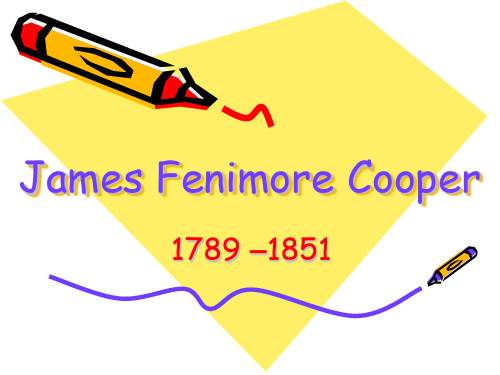
Virginia
He was born in Boston. But shortly, he became an orphan, both of his parents died. A merchant of Richmond, Virginia adopted him.
Virginia University
Virginia
As a editor, Poe had a secure position and a steady income, he married his young cousin, Virginia, who was 13 years old, in 1835. But later, Virginia died of tuberculosis(结核 病). He liked drinking very much. His death was related to it. And his death remained a mystery.
Ratiocination(推理)
―The Murders in the Rue Morgue‖ 《莫格街谋杀案》 ―The Gold Bug‖《金甲虫》 ―The Purloined Letter‖《被窃的信件》
―The Mystery of Marie Roget‖ 《玛丽罗杰谜案》
ቤተ መጻሕፍቲ ባይዱ
works
January 19, 1809 – October 7, 1849.
He was an American author,
poet,
editor and literary critic, considered part of the American Romantic Movement.
爱伦坡的乌鸦赏析

爱伦坡的乌鸦赏析The RavenThe Raven was written by Edgar Allan Poe in 1844. As the best known of Poe’s verse, it narrated a story that a man suffering the pain of losing relatives encountered a raven at a lonely and depressed night. The tone of the verse, miserable and suspicious, derived from irreversible hopelessness. At the same time, the hopelessness was intensified with “Nevermore” from the raven until hopelessness was hard to see.As the only word of the raven, “Nevermore” was repeated for eleven times. It was th e name of the raven as well as the answer to the author’s every inquiry. The word sounded like irrelevant answer; but it made people think it was very suitable for the situation. It pushed the scene of fantastic dialogue into the philosophic narration on e xistence value. The all that people love most is just like the raven’s noise which will never come back if it is lost.A deep night in December, dark and cold, is the unbearable psychological portrayal of the narrator. It is this kind of mental state attracted the raven which perched upon a bust of Pallas just above the author’s chamber door. The raven conveyed the message from Hades again and again. At the same time, it took advantage of its’ raucous and harsh word—“Nevermore” to peck the broken heart o f the author. In this way, the author’s soul was settled down into low-floating shadow.In my mind, I think the verse does well in the following three aspects. Of course, they are worthy for us spending time appreciating it.Firstly, on the phonological processing, Edgar Allan Poedeeply dug the potential of English on the verse. Except that, he used a lot of alliteration, rhyme and harmonic rhyme. At the same time, he paid much attention on careful arrangement on the sound. In very section, there were a series of short verses composed of a long line. The order of using this way was to change atmosphere for every line. It loyally expressed the author’s sad mood. This way of writing made readers impressive.Secondly, The Raven modeled two important figures: young man and the raven. The sad man lost his favorite female and attempted to be absorbed in the book in order to forget the hurt. But all he did made a futile effort. The more books he read the lonelier and sad he felt. However, at midnight, the raven symbolizing death and odiousness stepped into the cabin where the young man usually met with his lover Lenore. In addition to, the poet also modeled two significant images influencing the topic of the poem. The one of was black that the pure color could make people feel happy or dejected. The black background color could make readers feel impressed, and then they could feel the fear and sorrow in the heart of the young man.“Nevermore” emerging repeatedly could also be seen as a special figure. Except the original meaning of this word, it also had symbolized meaning. When the raven appeared on the scene, the heartbroken man asked its’ name. The answer of the raven was “Nevermore”. But when the mater inquired effective medicine to remove miss for Lenore, the r aven answered by “Nevermore”, as well as the master wondering whether he met Lenore again. Even when the raven was ready to leave the cabin, the “Nevermore” was the only thing that the raven remained. This word made the young man get into eternal abyss.Thirdly, the scene setting was special. On the introductory part, the readers could see a sad and shrill picture in the depth of night: the gloomy atmosphere, the thrilling scene, the mysterious and depressed man, the inauspicious raven…In a gloomy and chilly midnight, all was quiet besides the whistle of the cold wind and the voice of turning over the books. The world outside the cabin was enveloped by the deep night while the small space of inside appeared flickered under the dim ray. Suddenly, some one was gently rapping at chamber door. However, when the master opened the door, he founded nothing except relentless night and raging storm. Surprisingly, the previous knock of the door appeared again when he retuned. At the moment, the raven flew into his cabin and perched above chamber door.Finally, why the author chose midnight as the time of story happening. Midnights mean mystery and terror. And all kinds of ghost and evil usually appeared at midnight. The terrified atmosphere established mood for appearance of the raven. It was special for the poet to set the story in a small and quiet cabin. On one hand, small and closed space contributed to the establishment of isolated and distant Gothic horrible atmosphere. On another hand, the cabin just was throne of two lovers. The cabin wasstill same while the laughter gone with hostess’s death. The young man kept watches the cabin and missed his lover. What kind of sadness it was? Setting the scene in this way will arouse resonate in readers’ heart and make the readers show sym pathy for the young man.The Raven is a wonderful poem. It is worthy for us spending time reading.。
《乌鸦》赏析
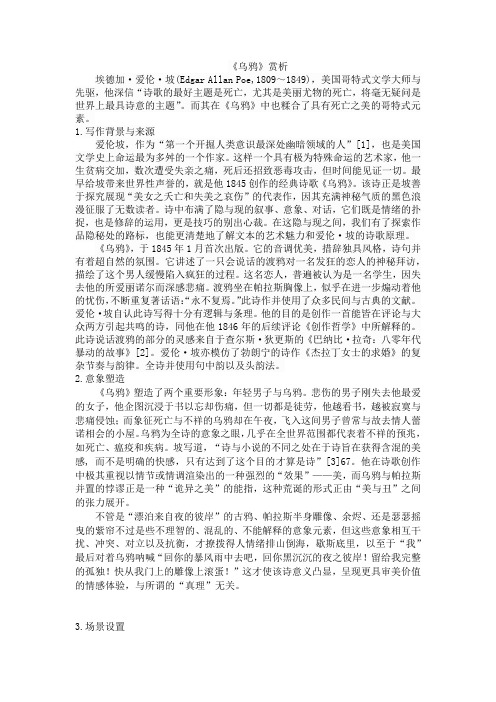
《乌鸦》赏析埃德加·爱伦·坡(Edgar Allan Poe,1809~1849),美国哥特式文学大师与先驱,他深信“诗歌的最好主题是死亡,尤其是美丽尤物的死亡,将毫无疑问是世界上最具诗意的主题”。
而其在《乌鸦》中也糅合了具有死亡之美的哥特式元素。
1.写作背景与来源爱伦坡,作为“第一个开掘人类意识最深处幽暗领域的人”[1],也是美国文学史上命运最为多舛的一个作家。
这样一个具有极为特殊命运的艺术家,他一生贫病交加,数次遭受失亲之痛,死后还招致恶毒攻击,但时间能见证一切。
最早给坡带来世界性声誉的,就是他1845创作的经典诗歌《乌鸦》。
该诗正是坡善于探究展现“美女之夭亡和失美之哀伤”的代表作,因其充满神秘气质的黑色浪漫征服了无数读者。
诗中布满了隐与现的叙事、意象、对话,它们既是情绪的扑捉,也是修辞的运用,更是技巧的别出心裁。
在这隐与现之间,我们有了探索作品隐秘处的路标,也能更清楚地了解文本的艺术魅力和爱伦·坡的诗歌原理。
《乌鸦》,于1845年1月首次出版。
它的音调优美,措辞独具风格,诗句并有着超自然的氛围。
它讲述了一只会说话的渡鸦对一名发狂的恋人的神秘拜访,描绘了这个男人缓慢陷入疯狂的过程。
这名恋人,普遍被认为是一名学生,因失去他的所爱丽诺尔而深感悲痛。
渡鸦坐在帕拉斯胸像上,似乎在进一步煽动着他的忧伤,不断重复著话语:“永不复焉。
”此诗作并使用了众多民间与古典的文献。
爱伦·坡自认此诗写得十分有逻辑与条理。
他的目的是创作一首能皆在评论与大众两方引起共鸣的诗,同他在他1846年的后续评论《创作哲学》中所解释的。
此诗说话渡鸦的部分的灵感来自于查尔斯·狄更斯的《巴纳比·拉奇:八零年代暴动的故事》[2]。
爱伦·坡亦模仿了勃朗宁的诗作《杰拉丁女士的求婚》的复杂节奏与韵律。
全诗并使用句中韵以及头韵法。
2.意象塑造《乌鸦》塑造了两个重要形象:年轻男子与乌鸦。
爱伦坡诗歌《乌鸦》的艺术魅力分析

荣格认为, 作为一名艺术家,他为了完成一个艰巨任务——负荷并体现人类下意识的心灵生活,他有时候必须牺牲自己的幸福,牺牲一切使得人生对于寻常的人值得活下去的东西[1]103。
埃德加·爱伦·坡(Edgar Allan Poe,1809~1849),作为“第一个开掘人类意识最深处幽暗领域的人”[2],也是美国文学史上命运最为多舛的一个作家。
这样一个具有极为特殊命运的艺术家,幼时遭父遗弃,不到三岁母亲病亡,由艾伦夫妇收养。
成年后,他学业优异却因天性叛逆,酗酒成性,数次辍学,之后,养父母也相继离世,27岁的坡娶了年仅13的表妹弗吉尼亚,而这样一位让坡“与令人讨厌、令人憎恶、令人失望的生活抗争之最大而唯一的动力”的亲人24岁便香消玉殒。
坡缠绵病榻,感叹:“那是一种介乎于希望与绝望之间的漫无尽头的可怕的彷徨,我要不一醉方休就没法再承受那种煎熬。
从那正是我自己生命的死亡中,我感觉到了一种新的,可是——上帝啊!一种多么悲惨的存在”。
他一生贫病交加,数次遭受失亲之痛,死后还招致恶毒攻击,但时间能见证一切。
时至今日,坡作为美国文坛一流文学大师的地位已毋容置疑,“可以说他是美国有史以来最具有原创性的作家。
他喜欢描写荒凉的虚幻的世界,喜欢窥探人类灵魂的最隐秘之处。
他创造了浩瀚壮观的梦境,创造了生动的幻景和恐怖的迷宫”[2]。
最早给坡带来世界性声誉的,就是他1845创作的经典诗歌《乌鸦》。
该诗正是坡善于探究展现“美女之夭亡和失美之哀伤”的代表作,因其充满神秘气质的黑色浪漫征服了无数读者。
诗中布满了隐与现的叙事、意象、对话,它们既是情绪的扑捉,也是修辞的运用,更是技巧的别出心裁。
在这隐与现之间,我们有了探索作品隐秘处的路标,也能更清楚地了解文本的艺术魅力和爱伦·坡的诗歌原理。
一.叙事的隐与现《乌鸦》是一首带有诡异色彩的叙事体诗歌。
以“我”的内心独白,在超自然氛围中展叙男主人翁失去至爱亲人丽诺尔(Lenore)的悲伤抑郁之情。
《乌鸦》赏析

《乌鸦》赏析导言《乌鸦》是美国诗人埃德加·爱伦·坡(Edgar Allan Poe)于1845年所创作的一首哀怨之诗,以乌鸦与悲痛失去恋人联想而作,叙述了主人公,也就是那个只能追忆已故恋人的人,被一只常鸣“Nevermore”(永不再此)的神秘乌鸦不断引向绝望。
该诗不仅有着深刻的悲苦情感,同时人物塑造、音韵的韵律感以及主旋律的渲染等方面也均给读者留下了深刻印象,是美国文学史上不可或缺的重要篇章之一。
正文诗人本身埃德加·爱伦·坡曾是19世纪美国浪漫主义诗歌和短篇小说的佼佼者,他的作品涉及到爱情、死亡、犯罪、恐怖等主题。
而该诗恰恰是他的代表之作,反映了他所独爱的主题:痛苦和孤独。
他自幼丧父、少年时代又被遗弃,一生中伴随着许多悲惨遭遇,也为此体验了很深刻的痛苦,因而在创作中不乏这样的主题。
《乌鸦》的一个强烈的主题就是人的绝望和痛苦。
诗歌分析1.乌鸦诗歌的动物形象乌鸦固是十分重要,犹如拉法耶夫(Ivan Pavlov)的实验狗和奖励键(reward key),它代表着人物的精神和心理的状态。
文中的乌鸦被描写为一只“黑漆漆的乌鸦”,它的形象与阴暗压抑的情感完美契合。
最重要的是,乌鸦作为一个象征,持续挑逗人们的思维是将痛苦引向终点:死亡。
于是,作品中描绘的不仅是主人公痛苦的经历,更是他的内心冷漠和绝望。
2.音韵和韵律诗歌的韵律有趣而又独特,每一句都以“A-B-C-B-B”结尾,这种诡异的韵律营造出了一种听众无法逃避的压迫感,让读者不得不将注意力投向每一行的结局。
此外,作者还加入了大量的音韵,例如不可忽略的“乌鸦”名言,这些特定的字眼为全诗提供了一种耳语的氛围,让读者更加感受到强烈的紧张感和恐惧感。
3.主旋律诗歌的主旋律是人物的绝望痛苦,这是一种非常普遍的故事,但坡将它渲染得让读者感觉到自己也在深渊中挣扎。
读完这首诗,很难不感受到令人窒息的孤独和无望,即使诗歌中的乌鸦有时显得有些傻气和幽默,却只是让我们更加陷入了无尽的绝望。
艾伦坡-《乌鸦》中英对照

The Raven 乌鸦Once upon a midnight dreary, while I pondered, weak and weary, Over many a quaint and curious volume of forgotten lore—While I nodded, nearly napping, suddenly there came a tapping, As of someone gently rapping, rapping at my chamber door.“’Tis some visitor,” I muttered, “tapping at my chamber door—Only this and nothing more.”Ah, distinctly I remember it was in the bleak December;And each separate dying ember wrought its ghost upon the floor.Eagerly I wished the morrow; —vainly I had sought to borrowFrom my books surcease of sorrow—sorrow for the lost Lenore—For the rare and radiant maiden whom the angels name Lenore—Nameless here for evermore.And the silken, sad, uncertain rustling of each purple curtain Thrilled me—filled me with fantastic terrors never felt before;So that now, to still the beating of my heart, I stood repeating“’Tis some visitor entreating entrance at my chamber door—Some late visitor entreating entrance at my chamber door; —This it is and nothing more.”Presently my soul grew stronger; hesitating then no longer, “Sir,” said I, “or Madam, truly your forgiveness I implore;But the fact is I was napping, and so gently you came rapping,And so faintly you came tapping, tapping at my chamber door, That I scarce was sure I heard you”—here I opened wide the door; —那是一个沉寂的午夜,许多已被忘却的恢诡谲怪萦绕心头,使我精疲力竭。
乌鸦翻译及注释

乌鸦翻译及注释.txt只要你要,只要我有,你还外边转什么阿老实在我身边待着就行了。
听我的就是,问那么多干嘛,我在你身边,你还走错路!跟着我!不能给你幸福是我的错,但谁让你不幸福,我TMD去砍了他注释:(1) I had tried to borrow from my books surcease of sorrow: 我竭力读书,想以此排遣心中的哀伤。
Surcease是古体,意思是终止阻止(2) a bust of Pallas:帕拉斯女神的胸像,帕拉斯就是希腊神话中的雅典娜(Athena)。
(3) the Night's Plutonian shore:黑夜中的的冥界的冥界海岸(4)subalunary being 地球上的人们。
Subalunary意思是月球之下的,地球之上的。
有的版本改为 living human being。
(5) stock and store:库存物品。
此处指乌鸦模仿的人语(6)Nepenthe希腊神话中的忘忧药。
后泛指一切是人忘记忧愁的东西。
(7) Is there balm in Gilead?这里讥讽的引用了圣经中的一句:Is there no balm in Gilead; is therd no physician there? 难道基列没有止痛药?难道那里没有医生吗?(基列是死海边的一片山区,生长着许多药用植物)乌鸦(爱伦·坡著)◇曹明伦译(安徽文艺出版社1999年版本)从前一个阴郁的子夜,我独自沉思,慵懒疲竭,面对许多古怪而离奇、并早已被人遗忘的书卷;当我开始打盹,几乎入睡,突然传来一阵轻擂,仿佛有人在轻轻叩击——轻轻叩击我房间的门环。
“有客来也”,我轻声嘟喃,“正在叩击我的门环,惟此而已,别无他般。
”哦,我清楚地记得那是在风凄雨冷的十二月,每一团奄奄一息的余烬都形成阴影伏在地板。
我当时真盼望翌日——因为我已经枉费心机想用书来消除伤悲,消除因失去丽诺尔的伤感,因那位被天使叫作丽诺尔的少女,她美丽娇艳,在此已抹去芳名,直至永远。
The-Raven译文
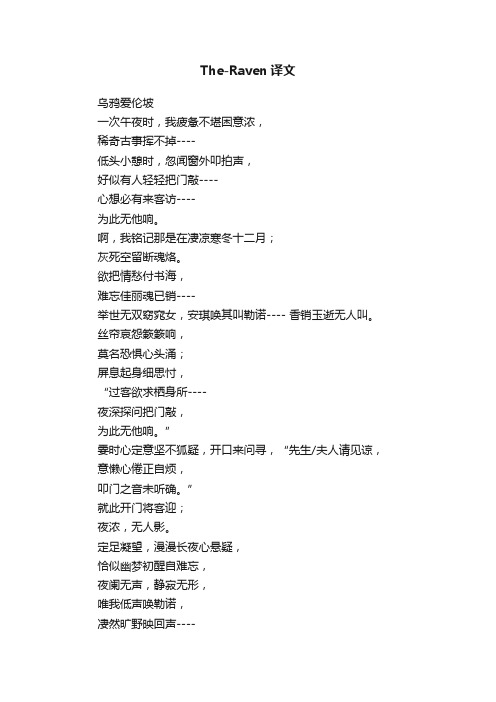
The-Raven译文乌鸦爱伦坡一次午夜时,我疲惫不堪困意浓,稀奇古事挥不掉----低头小憩时,忽闻窗外叩拍声,好似有人轻轻把门敲----心想必有来客访----为此无他响。
啊,我铭记那是在凄凉寒冬十二月;灰死空留断魂烙。
欲把情愁付书海,难忘佳丽魂已销----举世无双窈窕女,安琪唤其叫勒诺---- 香销玉逝无人叫。
丝帘哀怨簌簌响,莫名恐惧心头涌;屏息起身细思忖,“过客欲求栖身所----夜深探问把门敲,为此无他响。
”霎时心定意坚不狐疑,开口来问寻,“先生/夫人请见谅,意懒心倦正自烦,叩门之音未听确。
”就此开门将客迎;夜浓,无人影。
定足凝望,漫漫长夜心悬疑,恰似幽梦初醒自难忘,夜阑无声,静寂无形,唯我低声唤勒诺,凄然旷野映回声----为此无他响。
转身回屋,心有余悸难平息,窗边又起叩击声,阵阵不绝耳。
“始知屋外不明之物在眼前,欲将个中究竟细细探----安神初定前去找,唯风无他响。
”卷帘开窗,鼓翼振翅飞入一乌鸦,神态自若如智者;不卑不亢,快若迅雷栖我处,风度无人肖----飞旋落定如玉女神帕拉丝----宜栖宜坐岿不动。
但见其神情肃穆现高贵,顿使我悲郁情怀化笑颜,“你貌若凡鸟而神自定,让我想起古之神鹊黄泉落,敢问你彼岸尊姓和大名,”乌鹊答道“永不再会”。
其貌不扬一小鸟,吐字清晰令人奇,纵然词不搭意难自圆,世人罕有此经历,有幸目睹它登门,飞落室内神雕塑,自唤名曰“永不再会”。
只见它静若雕像独端坐,倾注灵魂于斯语,唯此不言也不动----我低声哀叹“亲朋皆逝我独留----明日它亦弃我而去无望还。
”乌鸦即和“永不再会”。
惊闻接语称心又体贴,始知其开口无他语,必逢主人不幸遭磨难,无奈常叹此一言,长歌当哭忧愤起,感慨“永不再会”。
而我已是悲思转笑颜,侧身就座其栖息处,慵倦陷沉思,揣度这只亘古不祥鸟,冷酷,笨拙,恐怖又憔悴,缘和嘶叫“永不再会”。
我攒眉思忖不作响,眼前它目光炯炯将我灼;见我心驰神态依旧,灯下安然斜靠丝绒丝绒衬,而今物是人非,纵心念佳人,已是永不再会。
- 1、下载文档前请自行甄别文档内容的完整性,平台不提供额外的编辑、内容补充、找答案等附加服务。
- 2、"仅部分预览"的文档,不可在线预览部分如存在完整性等问题,可反馈申请退款(可完整预览的文档不适用该条件!)。
- 3、如文档侵犯您的权益,请联系客服反馈,我们会尽快为您处理(人工客服工作时间:9:00-18:30)。
乌鸦
很久前一个阴郁的午夜,我感到疲惫而又慵懒
一边沉思着那些早已为世人遗忘的离奇书卷
一边又点头连连,睡意恹恹。
忽有敲门声回响在耳畔
仿佛有人轻轻地、轻轻地叩响了我的门环
“这是某位来客”,我嘀咕着说,“在把房门叩击
——仅此而已,别无它事!”
啊!我至今清晰犹记,那是一个凄楚的冬季
每一块儿将尽而未尽的木炭,依然在地板上幽灵般熰燃
我急切地守候着天亮,并且徒劳地希望
能够在书中聊且把悲伤埋葬,为那逝去的丽诺而哀伤
为那天使称其为丽诺的、明净而又唯一的姑娘,
——而今却永远,无以仿佛其形象。
每一个紫色的丝绸窗帘,都发出瑟瑟的低沉哀怨
让我心惊,让我感到前所未有的莫名惶恐
直到现在,我的心仍旧在不停悸动
“这是某位来客,恳请借宿休息
某位晚归的来客,恳请借宿于此
——仅此而已,别无它事!”
我的心很快变得坚强,不再那么犹豫而又彷徨
“先生?或者是女士”,我说,“我真诚地向您表达歉意
当您前来敲门儿,正好我正在打盹儿
您轻轻地敲门,是如此之轻盈
以至于我不能肯定,我是否真的听清。
”于是我把房门打开
——但见漆黑一片,空无一物存在
我极目向黑暗中张望,长久地矗立着,恐惧而又迷茫
疑虑、冥思,冥思那些无人敢于冥思的问题
然而沉静依然如故,死寂一如其初
唯一听到的话语,是那低声的私语,“丽诺?”
我这么说着,并听到回声从耳旁掠过,“丽诺!”
仅此而已,别无它事。
转身走入房门,心中犹如火焚
更响的敲门声再次响起
“肯定是”,我说,“肯定是什么东西扰动了窗格子
让我去,让我去探清那里的秘密
让我的心稍事平息,好弄清楚这里的底细。
”
——是风而已,别无它事。
当我伸手拉开百叶窗,却看到一只乌鸦振动着翅膀
一只远古传说中的庄严的乌鸦从天而降
没有半点的谦恭,没有半刻的暂停
俨然一位夫人或主人,蹲居于我的房门
恰恰蹲居在我的房门之上,栖息于那尊半身的雅典娜塑像
——就这样蹲居,就这样栖息,仅此而已,别无它事。
我的迷思变成了微笑
皆因这黑鸟阴沉而又冷峻的容貌
“尽管你的鸟冠平坦如剪,你却一定不是懦夫”,我敢断言
“不是阴森可怖的古老乌鸦,飞离于冥夜的海岸
告诉我,在普鲁同的冥夜之岸,该如何把你高贵的名字呼唤!”
乌鸦答曰:“永不复焉。
”这只笨拙的禽鸟居然能够如此直接地听懂话语,这是我始料未及尽管它的回答毫无意义,荒诞无稽
因为我们不得不承认,没有哪位世人
能有幸看到禽鸟栖息于房门
鸟或兽蹲居于房门之上,雕像之颠
名字唤作“永不复焉”。
但这乌鸦,寂寂蹲居于雕像之上,仅仅说出这一个词汇
如同他的整个灵魂都倾注到了这一词语之内
不闻更多话语,不睹再振羽翼
直到我情不自禁地呢喃:“朋友皆已弃我而去
他也终将飞离,在明天;如同希望曾逝去,在从前。
”
乌鸦答曰:“永不复焉”。
如此迅捷的回答击碎了宁静,也让我大吃一惊
“毫无疑问”,我想,“这句话就是他心中储藏的所有内容
获自某一命运多舛的主人,残酷的灾难
纷纷芸芸、接踵而至,直到他的歌声只有一个旋律
直到他的希望之挽歌把此忧郁的主题承担
那就是“永不复焉”。
但这乌鸦依然诱我悲伤的心灵绽放出了微笑
我径直转动软垫座,正对这雕像、房门,和禽鸟
在天鹅绒垫椅中,我开始了思考
幻想接着迷思,思索这古昔不祥鸟叫声之意义
这古昔之冷峻、笨拙、可怖、憔悴的不祥鸟
“永不复焉”,嘶哑啼叫。
我全神贯注地猜测,却无语向乌鸦诉说他凌厉的双眼穿透了我的胸膛就这样坐着进行猜想,脑袋斜倚
在软垫天鹅绒衬里上,灯光惬意、熠熠闪亮
但这灯光照耀下的紫色天鹅绒衬里,
她却永远、永远,啊,无法再偎依。
我忽而觉得空气变得十分郁馥,室内异常馨香
六翼天使在摇转无形的香炉,其脚步在缨穗装饰的地板上叮当作响“可怜虫呀!”我叫道,“上帝已经借给你,通过这些天使他已经送给你止疼剂,止疼剂和忘忧药,任关于丽诺的记忆随风飘
痛饮吧!哦!痛饮这仁慈的忘忧药,彻底把逝去的丽诺忘掉!”
“永不复焉”乌鸦说道。
“先知还是灵异,若是先知”,我禁不住说,“是禽鸟还是恶魔
送你来此的就是撒旦,抑或是暴风雨抛你上岸
凛然无畏地降临在这如此凄惨、且中邪了的魔幻荒原
在这恐怖笼罩的孤单家园,请如实地告诉我,我向您祈愿
向您呼喊,是否是,是否是有香草飘摇在基列山
乌鸦答曰:“永不复焉”。
“先知还是灵异,若是先知”,我禁不住说,“是禽鸟还是恶魔
当着我们共同崇拜的上帝,当着头顶的苍天
告诉这伤痕累累的心智,在那遥远地伊甸园
他将要拥抱一位姑娘,飘渺若仙,
一位天使称其为丽诺的、明净的姑娘,超逸尘寰
乌鸦答曰:“永不复焉”。
“就当这是我们分手的宣言,管你是禽鸟还是撒旦!”我突然跳起,如此惊叹“滚回你的暴风雨中,滚回你普鲁同的冥夜之岸
不要丢下任何羽毛,让我记起你反复如是的谎言
让我的寂寞平静如往年,不要在我的门庭如此盘桓
把你地鸟喙从我心中移走,也别留下身影在我门前
乌鸦答曰:“永不复焉”。
但这只乌鸦,就这么栖息,就这么栖息
栖息在我的房门之前,蹲居在白色的半身雅典娜雕像之巅
他的眼睛犹如一对儿精灵,在做着迷梦
流动的灯光把他的身影,洒落在地板之上
而我的心灵,陷溺于那地板上漂移的阴影
将永远不能、不能再飞动!。
